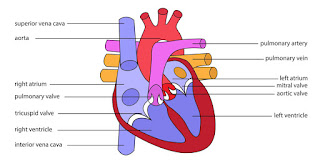Types And Symptoms Of Sleepapnea
 Sleep apnea is a potentially serious sleep disorder in which breathing stops and starts several times. If you snore loudly and feel tired even after a full night's sleep, you may be suffering from sleep apnea.
Sleep apnea is a potentially serious sleep disorder in which breathing stops and starts several times. If you snore loudly and feel tired even after a full night's sleep, you may be suffering from sleep apnea.The main types of sleep apnea are:
Obstructive sleep apnea, the most common form that occurs when the throat muscles relax
Central sleep apnea, which occurs when your brain does not send appropriate signals to the muscles that control breathing
Complex Sleep Apnea Syndrome, also known as central sleep apnea, which occurs when a person suffers from obstructive sleep apnea and central sleep apnea
If you think you have sleep apnea, consult your doctor. The treatment can relieve your symptoms and help prevent heart problems and other complications.
Symptoms of sleep apnea
The signs and symptoms of obstructive and central sleep apnea overlap, which sometimes makes it difficult to determine your type. The most common signs and symptoms of obstructive and central sleep apnea include:
- Loud snoring
- Episodes in which you stop breathing during sleep - reported by another person
- Breathless
- Wake up with dry mouth
- Headache in the morning
- Difficulty staying asleep (insomnia)
- Excessive daytime sleepiness (hypersomnia)
- Difficulty paying attention while being awake
- Irritability
When to see a doctor
Intense snoring may indicate a potentially serious problem, but not all people with sleep apnea. Tell your doctor if you have signs or symptoms of sleep apnea. Ask your doctor if you have a sleep problem that leaves you feeling tired, sleepy and irritable.
The causes
Obstructive sleep apnea
This happens when the muscles in the back of the throat relax. These muscles support the soft palate, the piece of triangular tissue suspended from the soft palate (uvula), the tonsils, the lateral walls of the throat and tongue.
When the muscles relax, your airways tighten or contract when you inhale. You can not get enough air, which can lower the level of oxygen in your blood. Your brain senses your inability to breathe and briefly avoids you from sleeping so you can reopen your airways. This alarm is usually so brief that you do not remember it.
You could sniff, choke or gasp. This pattern can be repeated five to 30 times or more every hour, all night, which affects your ability to reach deep and resting sleep phases.
Central sleep apnea
This less common form of sleep apnea occurs when your brain fails to transmit signals to your respiratory muscles. This means that you make no effort to breathe for a short time. You may wake up with shortness of breath or have trouble falling asleep or staying asleep.
Risk factors
Sleep apnea can affect anyone, even children. But some factors increase your risk.
Factors that increase the risk of this form of sleep apnea include:
Overweight. Obesity greatly increases the risk of sleep apnea. Fat deposits around the upper respiratory tract may interfere with your breathing.
Collar size. People with thicker necks may have narrower airways.
Narrowed airways. You may have inherited a narrow gorge. Tonsils or adenoids can also enlarge and block the airways, especially in children.
To be a man Men are two to three times more likely to suffer from sleep apnea than women. However, women increase their risk in case of being overweight and their risk also seems to increase after menopause.
To be older Sleep apnea is significantly more common in the elderly.
Family history. Having family members with sleep apnea can increase your risk.
Use of alcohol, sedatives or tranquilizers. These substances relax the muscles of the throat, which can aggravate obstructive sleep apnea.
Smoking. Smokers are three times more likely to suffer from obstructive sleep apnea than people who have never smoked. Smoking can increase inflammation and fluid retention in the upper respiratory tract.
Nasal congestion. If you have trouble breathing through your nose -
Tentabs.in

Comments
Post a Comment